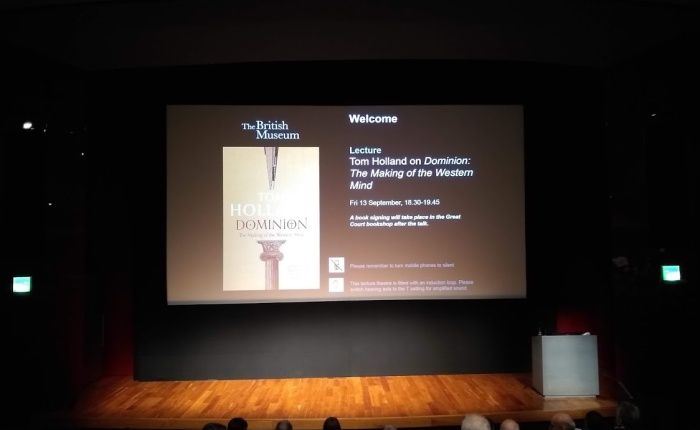The PA recently attended Tom Holland‘s lecture at the British Museum (13 September, 2019). Holland is an award-winning historian, biographer and broadcaster, and has a new book out called Dominion: The Making of the Western Mind. It explores the enduring impact Christianity has had on the west, and promises to be a fascinating read. This lecture was associated with the launch of Dominion, and there was a book signing afterwards. It’s worth noting that Holland is an agnostic: he seems sympathetic to Christianity, but is not a believer.
Holland began his lecture by explaining the origin of his fascination with history: as a boy, seeing an exhibition at the British Museum called the Wealth of the Roman World, AD 300-700. He recalled being attracted by the violence and savagery of the Romans, and being resentful that Christianity had hastened the Roman Empire’s decline, which had well advanced by AD 700. This visceral thrill as a child led to his channeling his inner nasty child into first writing about Rome and Greece!
Gradually, however, Holland became unsettled by the slavery and killing, eventually finding the Romans and Greeks frightening. He began to wonder why he found them so strange, and how we were so different. The Romans were terrifyingly alien – he wondered what transformed society’s ethics?
Christianity began with the crucifixion, and Holland pointed out its horror – it was the proper fate for scum, rebels and slaves. It was extraordinary that the Roman world would come to worship someone who suffered this fate – Paul realised it was a ludicrous proposition. The crucifixion was folly to gentiles – slavery is freedom, torture is liberation and defeat is victory – the antithesis of what the Romans believed. It was also a stumbling block to monotheistic Jews who worshipped God only, and the idea of a new covenant for all mankind did not fit their exclusivity. Moreover, Christianity claimed to dissolve all differences – there was no male or female, Jew or Greek. To the Romans, the Son of God was Caesar, but Paul writes that all are children of God. It introduced the idea of conscience – we can improve, be better people.
Moving to the recent past, Holland noted that Nietzsche was horrified at the cross, at the idea that the weak and poor could have importance. The Nazis didn’t believe that all people were equal either – some races were superior. After the Second World War though, the need for Christianity declined. The horror of Nazism made it unnecessary – the world didn’t need reminding that we were all equal and that obligations were owed to those in need.
Holland described how he visited a town called Sinjar when ISIS was still active. Here the Yazidis had been targeted by ISIS: women enslaved, and men and children killed. He described the horror of standing in a town where people had just been crucified, realising that crucifixion meant nothing to ISIS other than an instrument of torture. Here, he felt closer to appreciating the scale of the transformation that Christianity has wrought.
To conclude, Holland then answered some audience questions. One person asked if he thought Christianity was irrelevant now. Holland pointed out the explosion in Christianity in Africa, noting that because the supernatural is familiar there, it is working well. But in Western society, it has worked too well and has now seceded power to the secular.
The final question was more of a statement, and one that the questioner kept repeating: Christianity’s ethical teachings were already around, and the myth of a dying god was a familiar one – Osiris for example. Holland was very clear on his reply: yes, Christianity was the fusion of several philosophies, but the fusion resulted in something radically new. Jesus the nobody, crucified as a criminal to be worshipped as God? That was revolutionary. Every human being is equal and made in the image of God? There was nothing in Greek philosophy like this.
An informative and enjoyable evening!
Hear Tom Holland with N.T. Wright on the Unbelievable? program here. And a great article by Holland on how our society is saturated with Christian concepts here.
